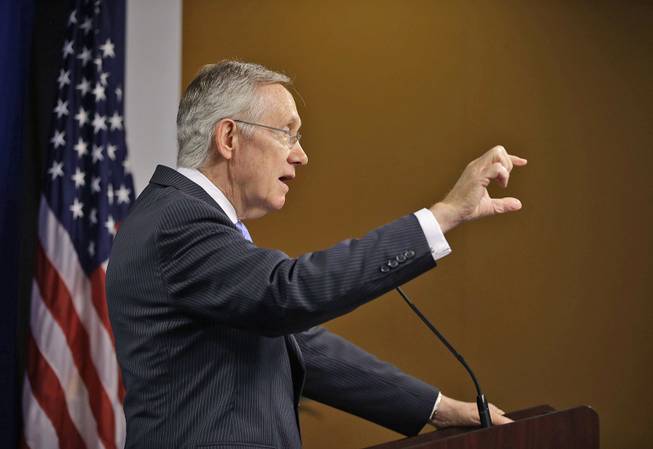
ASSOCIATED PRESS
Senate Majority Leader Harry Reid, D-Nev., speaks at the center for American Progress Action Fund in Washington, Monday, July 15, 2013. Reid spoke about ending the current gridlock in the Senate that according to him is harming the nation’s ability to address key challenges.
Published Tuesday, July 16, 2013 | 8:20 a.m.
Updated Tuesday, July 16, 2013 | 9:06 a.m.
Senate Majority Leader Harry Reid on Tuesday defused the “nuclear option” he’d been threatening to detonate in the Senate, all but ending speculation that he’d make good on threats to end the procedural filibuster for executive nominations.
“I think we see a way forward that will be good for everybody,” Reid said, indicating that Senate leaders still had “a few little i’s to dot and t’s to cross.”
“I think everyone will be happy,” Reid said. “This is not a time to flex muscles..It is a compromise. I think we get what we want, and they get what they want. It’s not a bad deal.”
Reid gave full credit to Arizona Sen. John McCain, a Republican, for coming up with a compromise that will allow Democrats to get the votes to confirm at least some of the seven nominees that Reid demanded receive a vote, in lieu of exercising what he claimed was his right to change the standing Senate rules by simple majority.
Republicans contended that Reid’s reading of the Constitution — “each House may determine the rules of its proceedings” — was flawed, and that it takes 67 Senators to approve a change to the rules.
Republicans lent enough support to Democrats Tuesday to move forward with the confirmation of Richard Cordray, the nominee to head the Consumer Financial Protection Bureau, an agency that Republicans have long despised.
Nevada’s Dean Heller did not vote in favor of Cordray’s nomination. But 17 other Republicans helped get a procedural motion on Cordray’s nomination, a filibuster-proof 71 to 29 vote.
Republicans were poised to lend enough support to Democrats to approve Richard Cordray, the nominee to head the Consumer Financial Protection Bureau — an agency that Republicans have long despised.
“This is a gesture of good faith,” Republican Sen. Bob Corker of Tennessee said Tuesday morning. “I hope members on the other side will note this good-faith effort.”
Republicans have been seeking a good-faith measure in exchange for their cooperation — specifically, a sign from Democrats that they will ask President Barack Obama to send the Senate new nominees for the National Labor Relations Board.
Obama appointed Sharon Block and Richard Griffin during what he claims was a congressional recess. But Republicans in Congress claim that the few days they were on break were not enough of a gap to warrant the president circumventing the congressional approval process.
Thus far, the courts have sided with Republicans.
Before the Cordray vote, Reid advised senators not to talk details of the deal until it was finally struck, informing senators they would be fully briefed on the final compromise by lunchtime.
Senators stayed in the Capitol until nearly 10 p.m. Monday, meeting in a closed-door session in the Old Senate Chamber, the main meeting room for the Senate from 1810 to 1859. The meeting ran for three and a half hours, but lawmakers from both sides of the aisle praised the session as time well spent.
“It was a long but productive discussion,” McCain said.
Reid said, “I hope that everyone learned the lesson last night that it sure helps to sit down and talk to each other.”
The Senate's favorable vote for Cordray’s nomination bought senators more time to finalize a deal on filibusters and nominations, while the official debate goes on.

Join the Discussion:
Check this out for a full explanation of our conversion to the LiveFyre commenting system and instructions on how to sign up for an account.
Full comments policy